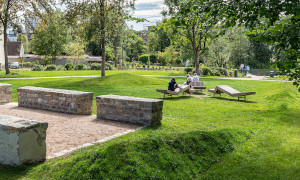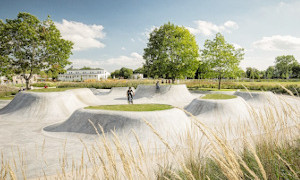Steffi Schüppel, Gwendolyn Kusters and Thomas Haas once again exchanged ideas with colleagues from European associations, students and practicing landscape architects on behalf of the profession at the IFLA Europe Conference and General Assembly, which took place in Budapest from October 17-20.
{gallery}
This year's motto of the two-day conference, which was organized by the Hungarian Landscape Architecture Association HALA, was "PLAN(e)TSCAPE" and highlighted the plant as an all-rounder in the face of climate change and the biodiversity crisis as well as an important design element. Practical examples from several European countries were used to illustrate innovative approaches to the use of plants in urban and rural contexts. Sandor Bardoczi, Head of the Green Space Office of the City of Budapest, presented the "Wildflowering Budapest" initiative, among others. This mainly involves sustainable green space management to increase biodiversity, especially in the mostly overlooked so-called roadside greenery. Another current project is the section-by-section traffic calming and multifunctional conversion of a main road along the Danube. Large-scale tree planting and permeable shrub beds have reduced heat stress and created additional infiltration areas, particularly in the event of flooding.
As a German example, Gwendolyn Kusters presented the strategy and concept planning of the "Anger" development area in Garbsen-Meyenfeld, which is characterized by sustainable land management in rural areas and pays particular attention to the blue-green infrastructure. Furthermore, Attila Vincze, landscape architect Pagony Kft, gave insights into his vision of "beyond diversity" for a successful and appealing design in combination with ecology in the design of species-rich planting concepts for public urban green spaces.
In the discussions that followed, it became clear that the consistent further development of innovative urban plant communities and intelligent plant combinations is still necessary, which have also proven to be promising in terms of cost-effectiveness and maintenance costs.
Two excursions on the following day with plenty of room for expert discussions to Pünkösdfürö Park, which was redesigned as a green corridor along the Danube from 2021 under ecological and climate-effective aspects, and Varosliget Park, which in its function as an inner-city meeting and recreational space will undergo a redesign in large areas between 2016 and 2024, including the renewal of water-permeable paths. The conference was rounded off by the renovation of water-permeable path surfaces, the construction of the new ethnographic museum with a green roof and a series of new sports and leisure facilities.
At the subsequent IFLA Europe General Assembly on October 19/20, a series of workshops on various topics were held in addition to the regular business, such as confirmation of the 2025 business plan, discussion of the annual reports of the Executive Board and the elections to the Board of Trustees and Executive Board. This interactive format is intended to further stimulate delegates' Europe-wide exchange beyond the General Assembly. Among other things, the workshops identified important areas of professional policy action such as the New European Bauhaus, the Green Deal or the introduction of a general training framework for landscape architecture (CTF) at EU level, developed a toolbox with information for professional associations in countries without state regulation and formulated concrete support options for young landscape architects. The results will now be translated into concrete professional policy actions vis-à-vis the European institutions and national governments and will be presented for discussion at the General Assemblies on an ongoing basis. Bruno Marquez, IFLA World President, took part as a guest. Finally, the resolution "PLAN(e)TSCAPE", which calls for a strong biodiversity transition and nature-based solutions to tackle climate change, was adopted unanimously. The next IFLA Europe Conference and General Assembly will take place in Brussels from October 18-20, 2025. The conferences are generally open to all interested parties.
- Latitude: 0
- Longitude: 0


